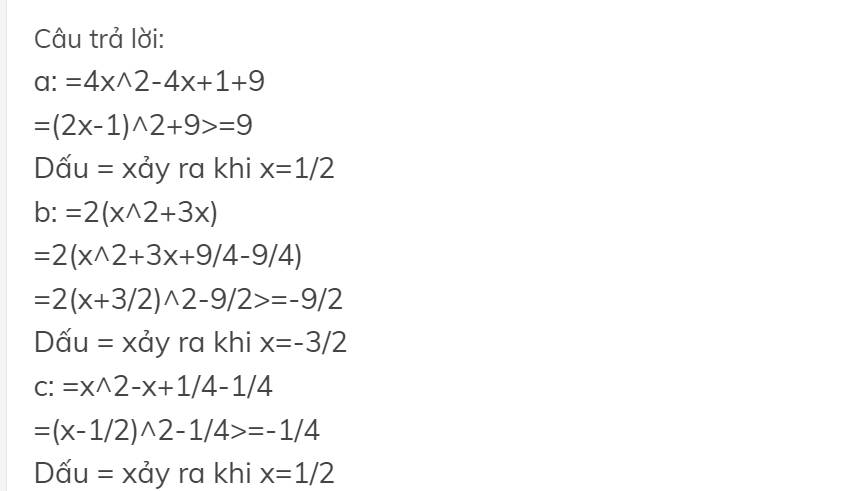Tìm Min:
a, A= 4x^2 - 4x +10
b, B= 2x^2 + 6x
c, C= x^2 - x
Hãy nhập câu hỏi của bạn vào đây, nếu là tài khoản VIP, bạn sẽ được ưu tiên trả lời.



a: =4x^2-4x+1+9
=(2x-1)^2+9>=9
Dấu = xảy ra khi x=1/2
b: =2(x^2+3x)
=2(x^2+3x+9/4-9/4)
=2(x+3/2)^2-9/2>=-9/2
Dấu = xảy ra khi x=-3/2
c: =x^2-x+1/4-1/4
=(x-1/2)^2-1/4>=-1/4
Dấu = xảy ra khi x=1/2

a: Ta có: \(x^2-x+1\)
\(=x^2-2\cdot x\cdot\dfrac{1}{2}+\dfrac{1}{4}+\dfrac{3}{4}\)
\(=\left(x-\dfrac{1}{2}\right)^2+\dfrac{3}{4}\ge\dfrac{3}{4}\forall x\)
Dấu '=' xảy ra khi \(x=\dfrac{1}{4}\)
b: Ta có: \(x^2+y^2-4x+y+5\)
\(=\left(x^2-4x+4\right)+\left(y^2+y+\dfrac{1}{4}\right)+\dfrac{3}{4}\)
\(=\left(x-2\right)^2+\left(y+\dfrac{1}{2}\right)^2+\dfrac{3}{4}\ge\dfrac{3}{4}\forall x,y\)
Dấu '=' xảy ra khi x=2 và \(y=-\dfrac{1}{2}\)

b: \(\Leftrightarrow48x^2-12x-20x+5-48x^2+36x=30\)
\(\Leftrightarrow4x=25\)
hay \(x=\dfrac{25}{4}\)

\(a,\Leftrightarrow\dfrac{3x^3+6x^2-3x-5x^2-10x+5}{x^2+2x-1}=10\\ \Leftrightarrow\dfrac{3x\left(x^2+2x-1\right)-5\left(x^2+2x-1\right)}{x^2+2x-1}=10\\ \Leftrightarrow3x-5=10\Leftrightarrow3x=15\Leftrightarrow x=5\\ b,\Leftrightarrow\left(x^4+2x^2-4x^2-8\right):\left(x-2\right)=0\\ \Leftrightarrow\left[\left(x^2-4\right)\left(x^2+2\right)\right]:\left(x-2\right)=0\\ \Leftrightarrow\left[\left(x-2\right)\left(x+2\right)\left(x^2+2\right)\right]:\left(x-2\right)=0\\ \Leftrightarrow\left(x+2\right)\left(x^2+2\right)=0\Leftrightarrow x=-2\left(x^2+2>0\right)\\ c,\Leftrightarrow\dfrac{x\left(x-4\right)}{\left(x-4\right)^2}=0\Leftrightarrow\dfrac{x}{x-4}=0\Leftrightarrow x=0\)

A = - 3\(x\).(\(x-5\)) + 3(\(x^2\) - 4\(x\)) - 3\(x\) - 10
A = - 3\(x^2\) + 15\(x\) + 3\(x^2\) - 12\(x\) - 3\(x\) - 10
A = (- 3\(x^2\) + 3\(x^2\)) + (15\(x\) - 12\(x\) - 3\(x\)) - 10
A = 0 + (3\(x-3x\)) - 10
A = 0 - 10
A = - 10

b: \(\Leftrightarrow x^4-4x^2+2x^2-8=0\)
\(\Leftrightarrow x+2=0\)
hay x=-2

a,
\(\Leftrightarrow\left(\left(2x^2-4\right)-2\left(x+1\right)^2\right)< 0\)
\(\Leftrightarrow2x^2-4-2\left(x^2+2x+1\right)< 0\)
\(\Leftrightarrow2x^2-4-2x^2-4x-2< 0\)
\(\Leftrightarrow-4x-6< 0\)
\(\Rightarrow x+\dfrac{3}{2}>0\)
\(\Rightarrow x>-\dfrac{3}{2}\)
\(x\in\left\{-\dfrac{3}{2};\infty\right\}\)
b/
\(\Leftrightarrow\left(x-3\right)^2-5+6x< 0\)
\(\Leftrightarrow x^2-6x+9-5+6x< 0\)
\(\Leftrightarrow x^2+4< 0\) ( điều này vô lý vì không có giá trị nào của x khiến x^2+4<0)
từ trên suy ra:
không có giá trị nào của x để pt này đúng .

a: Ta có: \(5\left(4x-1\right)+2\left(1-3x\right)-6\left(x+5\right)=10\)
\(\Leftrightarrow20x-5+2-6x-6x-30=10\)
\(\Leftrightarrow8x=43\)
hay \(x=\dfrac{43}{8}\)
b: ta có: \(2x\left(x+1\right)+3\left(x-1\right)\left(x+1\right)-5x\left(x+1\right)+6x^2=0\)
\(\Leftrightarrow2x^2+2x+3x^2-3-5x^2-5x+6x^2=0\)
\(\Leftrightarrow6x^2-3x-3=0\)
\(\Leftrightarrow2x^2-x-1=0\)
\(\Leftrightarrow\left(x-1\right)\left(2x+1\right)=0\)
\(\Leftrightarrow\left[{}\begin{matrix}x=1\\x=-\dfrac{1}{2}\end{matrix}\right.\)